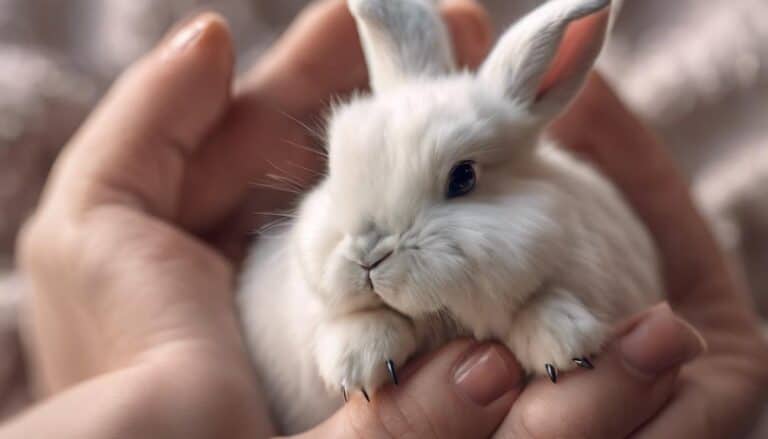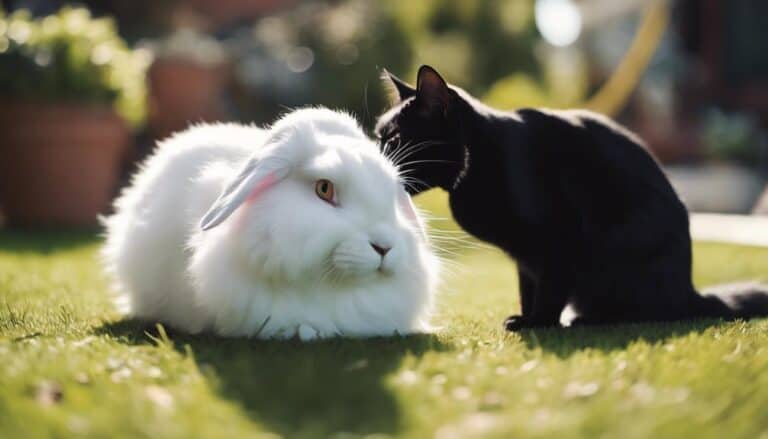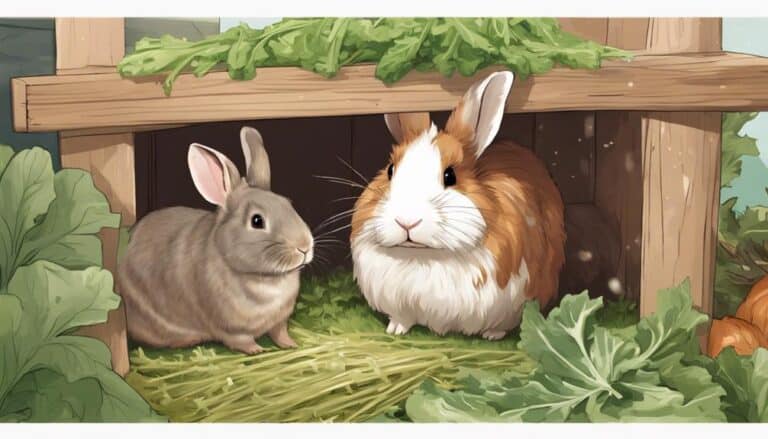Imagine a world where bunnies could explode – a bizarre and unsettling thought, isn't it?
While the idea may sound far-fetched, there are underlying factors that have contributed to this curious notion.
Delving deeper into the intricate workings of a bunny's anatomy and behavior might shed light on the origins of this peculiar myth.
Curiosity piqued? Let's unravel the mystery behind the explosive bunnies.
Contents
- 1 Key Takeaways
- 2 Origins of Exploding Bunny Myth
- 3 Bunny Digestive System Explained
- 4 Internal Factors Leading to Explosions
- 5 External Factors Causing Bunny Explosions
- 6 Preventing Bunny Explosions
- 7 Rabbit Health Concerns
- 8 Rabbit Safety Tips
- 9 Frequently Asked Questions
- 10 Can Bunnies Explode If They Feel Threatened and Run Away?
- 11 Conclusion
Key Takeaways
- Bunny explosions are a myth linked to improper care and feeding misconceptions.
- Proper diet, vet check-ups, and stress management prevent bunny health issues.
- Balanced nutrition, monitoring, and early detection are crucial for preventing bunny health risks.
- Environmental enrichment, care routines, and emergency preparedness ensure bunny well-being.
Origins of Exploding Bunny Myth

The origins of the exploding bunny myth can be traced back to rabbit feeding behavior and a reference in the game Maniac Mansion. In summary, the myth gained traction due to a misunderstanding of how baby rabbits are cared for and fed. Baby rabbits, also known as kits, have delicate digestive systems that require specific care and attention. This myth likely emerged from a lack of understanding about the needs of these young animals.
It is important to recognize that baby rabbits, like many young animals, are vulnerable and need appropriate care to thrive. By perpetuating myths like exploding bunnies, we risk spreading misinformation that could harm these adorable creatures. It's vital to prioritize the well-being of pets, especially when it comes to their health and dietary needs.
Understanding the origins of such myths not only sheds light on how misconceptions develop but also underscores the importance of responsible pet ownership. By educating ourselves about the realities of caring for baby rabbits, we can make sure that these cute animals are kept safe and healthy.
Bunny Digestive System Explained
Exploring the intricacies of a rabbit's digestive system reveals a unique and fascinating adaptation to their dietary needs. Here's a breakdown to help you better understand how a bunny's digestive system works:
- High-Fiber Diet Requirement: A baby rabbit's digestive system, just like an adult rabbit's, requires a high-fiber diet to maintain gut health. This means providing plenty of hay and fresh vegetables to support their digestion.
- Coprophagy: Baby rabbits, like adult rabbits, practice coprophagy, which involves consuming their own feces to re-digest and extract additional nutrients. While it may sound strange, this behavior is essential for their overall health.
- Essential Diet Importance: Ensuring a balanced diet of hay, fresh vegetables, and limited pellets is essential for a healthy baby rabbit's digestive system. Sudden changes in diet can disrupt the delicate balance of bacteria in their gut, leading to digestive issues.
- Nutritional Care: Proper nutrition is key to supporting a baby rabbit's developing digestive system. Providing the right balance of nutrients will help them grow strong and healthy.
Internal Factors Leading to Explosions
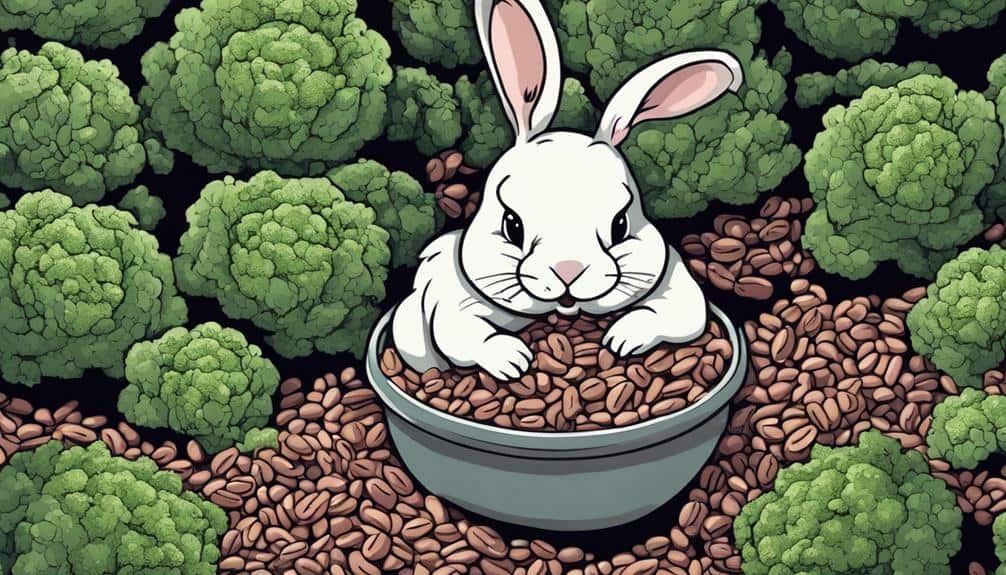
In understanding the potential causes of explosions in bunnies, it's important to recognize the significant impact of internal factors, particularly the development of tumors that can lead to critical pressure build-up.
Tumors within a bunny's digestive system, if left unchecked, can grow and disrupt normal functions, potentially causing internal ruptures that may result in explosive outcomes.
Regular veterinary check-ups play a crucial role in the early detection of such tumors, helping to prevent internal complications that could lead to dire consequences. Surgical removal of these tumors is a common treatment method to address internal issues that may contribute to explosive situations in bunnies.
Professional veterinary care and timely intervention are essential in managing internal factors that could lead to harmful outcomes for these adorable creatures. By staying vigilant and proactive in monitoring and addressing internal health concerns, you can help safeguard your bunny from the risks associated with internal factors that may lead to explosions.
External Factors Causing Bunny Explosions
External factors such as diet and digestion, as well as stress and anxiety, can play a role in the overall health of your bunny. Ensuring your rabbit has a balanced diet and managing their stress levels are pivotal in preventing potential health issues.
Diet and Digestion
When considering the diet and digestion of bunnies, it's important to understand the significant impact that food choices can have on their gastrointestinal health. Here are some important points to note:
- Bunnies need a well-balanced diet: Make sure they've a mix of hay, fresh vegetables, and limited pellets.
- Avoid high-carb and high-fat foods: These can cause gas accumulation and digestive issues.
- Prioritize fiber intake: Insufficient hay and fiber can lead to gut motility problems.
- Avoid sudden diet changes: Abrupt shifts can upset their delicate digestive balance and lead to bloating.
Stress and Anxiety
Considering the impact of stress and anxiety on bunnies' well-being, it's crucial to create a calm and secure environment to prevent potential explosions caused by external factors.
Loud noises, sudden movements, and unfamiliar surroundings can trigger stress in bunnies, leading to issues like gastrointestinal discomfort or bloating. When you pay attention to signs of anxiety such as excessive grooming or hiding, it allows for timely intervention to alleviate the bunny's distress.
To help your bunny feel secure and reduce the risk of explosions due to stress, provide familiar objects in their environment and engage in regular handling, socialization, and positive reinforcement. By addressing stress and anxiety proactively, you can promote your bunny's mental well-being and prevent potential explosions.
Preventing Bunny Explosions
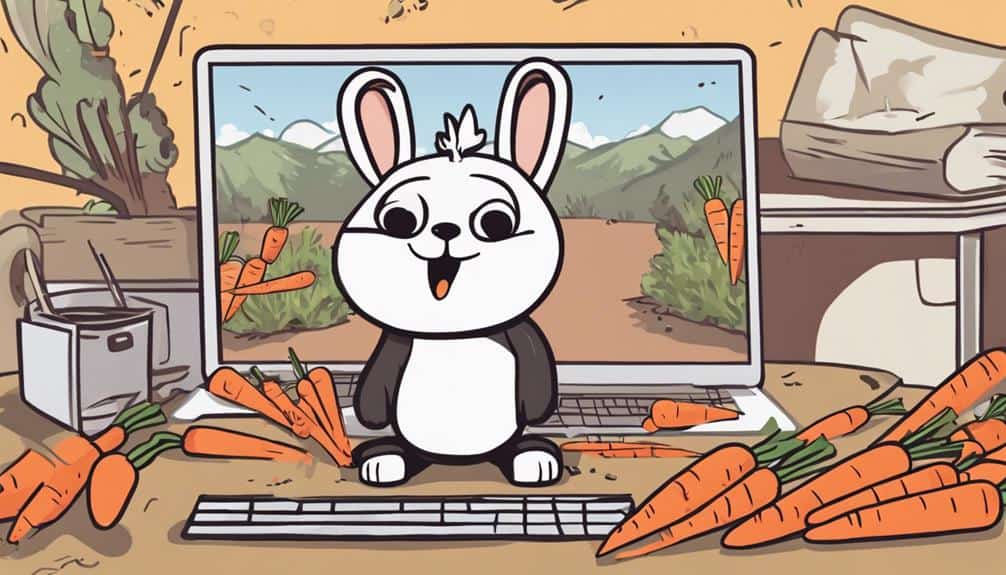
To prevent bunny explosions effectively in extensive areas like rangelands, it's important to adhere strictly to the Standard Operating Procedure (SOP) RAB007. This procedure prioritizes animal welfare and safety, confirming humane blasting practices with minimal impact on rabbit populations.
Here are some key steps to prevent bunny explosions:
- Use Appropriate Equipment: Utilize ANFO charges, hand augers, and crimping pliers for safe and effective warren destruction procedures.
- Follow SOP RAB007: Adhere to the standard operating procedure meticulously to guarantee the safety of both the bunnies and the operators.
- Monitor Blasting Effectiveness: Regularly assess the results of the blasting to make sure it's achieving the desired outcome of preventing bunny explosions.
- Adhere to State Guidelines: Comply with state regulations and guidelines to prevent any unintended consequences and to promote responsible blasting practices.
Rabbit Health Concerns
Ensuring your rabbit's well-being involves understanding the importance of their diet, recognizing common health issues, and implementing preventative care measures.
Regular check-ups with a veterinarian can help monitor your rabbit's health and catch any potential concerns early on.
Rabbit Diet Importance
The importance of maintaining a balanced and varied diet for your rabbit's health can't be overstated. When it comes to your bunny's diet, here are some key points to keep in mind:
- Frequency: Rabbit digestive systems require frequent small meals to prevent gastrointestinal issues.
- Variety: Providing a varied diet is essential to prevent obesity and maintain the best possible health in rabbits.
- Behavior: Understanding natural rabbit feeding behaviors helps make sure a balanced and nutritious diet.
- Health Risks: Lack of dietary variety can lead to health problems like dental issues and digestive disturbances in rabbits.
Common Health Issues
Maintaining your rabbit's health involves vigilance in recognizing and addressing common health issues such as dental problems, gastrointestinal stasis, and respiratory infections. Regular veterinary check-ups play a vital role in the early detection and treatment of these health concerns.
Like rabbits, Guinea Pigs are also prone to similar health problems, underscoring the importance of proper care. Providing your rabbit with a balanced diet, sufficient exercise, and a suitable living environment are essential for their overall well-being.
Being attentive to signs of illness in your rabbit, such as changes in appetite or behavior, enables prompt intervention and better outcomes. By staying informed about common health issues and proactive in seeking veterinary care, you can help assure a long and healthy life for your furry companion.
Preventative Care Tips
To keep your rabbit healthy and happy, prioritize regular veterinary check-ups for early detection of any potential health issues. Here are some preventative care tips to help you take care of your furry friend:
- Balanced Diet: Provide a diet rich in hay, fresh vegetables, and limited pellets to make sure your rabbit receives essential nutrients.
- Hydration and Space: Always have fresh water available and give your rabbit enough space for exercise to promote physical well-being.
- Monitoring: Keep an eye on your rabbit's weight and behavior, as changes may indicate underlying health issues.
- Clean Environment: Maintain a clean living space, free from hazards, to prevent illnesses and injuries.
Rabbit Safety Tips
Guarantee your rabbit's safety by creating a secure and stress-free environment with these essential tips.
Start by providing a spacious enclosure with proper ventilation to make sure your bunny has enough room to move around comfortably. Avoid sudden loud noises or stressful situations to prevent unnecessary fear or anxiety. Keep harmful objects like electrical cords, toxic plants, and small items that could be ingested out of reach to maintain a safe environment.
Regularly monitor your rabbit's health and behavior for any signs of distress or illness, seeking veterinary care promptly if needed. Additionally, make sure your rabbit has a balanced diet, fresh water, and opportunities for exercise to promote overall well-being and prevent health issues.
Frequently Asked Questions
Why Is My Bunny Suddenly Aggressive?
You may notice behavioral changes in your bunny due to various reasons like fear, stress, pain, or territorial behavior. Understanding their cues and consulting a vet is important. Positive reinforcement, enrichment, and a calm environment can help address sudden aggression.
Can Bunnies Have Heart Attacks?
Your bunny's heart health is crucial. While bunnies don't have heart attacks like humans, stressors can affect their hearts. Guarantee a low-stress home, gentle handling, and vet check-ups to safeguard against potential heart issues.
What Are the Threats to Rabbits?
Predator dangers threaten rabbits daily. Foxes, wolves, birds of prey, and pets pose risks. Diseases like myxomatosis, rabbit hemorrhagic disease, pests such as fleas, ticks, mites, and environmental hazards like extreme weather, toxic plants, all endanger bunnies.
How High Can Bunnies Fall?
You need to know how high bunnies can fall when bunny parachuting. Bunnies can safely handle falls of 4-5 feet. Beyond that, risks of fractures and worse injuries increase. Keep them safe with supervision and bunny-proofing.
Can Bunnies Explode If They Feel Threatened and Run Away?
Contrary to popular belief, bunnies running away facts do not include the potential for explosion when feeling threatened. While bunnies may sprint away in fear, they are not at risk of exploding. It’s important to understand accurate information about animal behavior to dispel myths and ensure proper care.
Conclusion
As you care for your fluffy companions, remember: exploding bunnies are a myth. By understanding their digestive system and providing a balanced diet, you can prevent health issues and guarantee their well-being.
Keep an eye out for any signs of tumors and seek professional veterinary care early on. Your furry friends rely on your attention and care to stay safe and healthy.
Let them hop happily, free from the fear of explosions.



